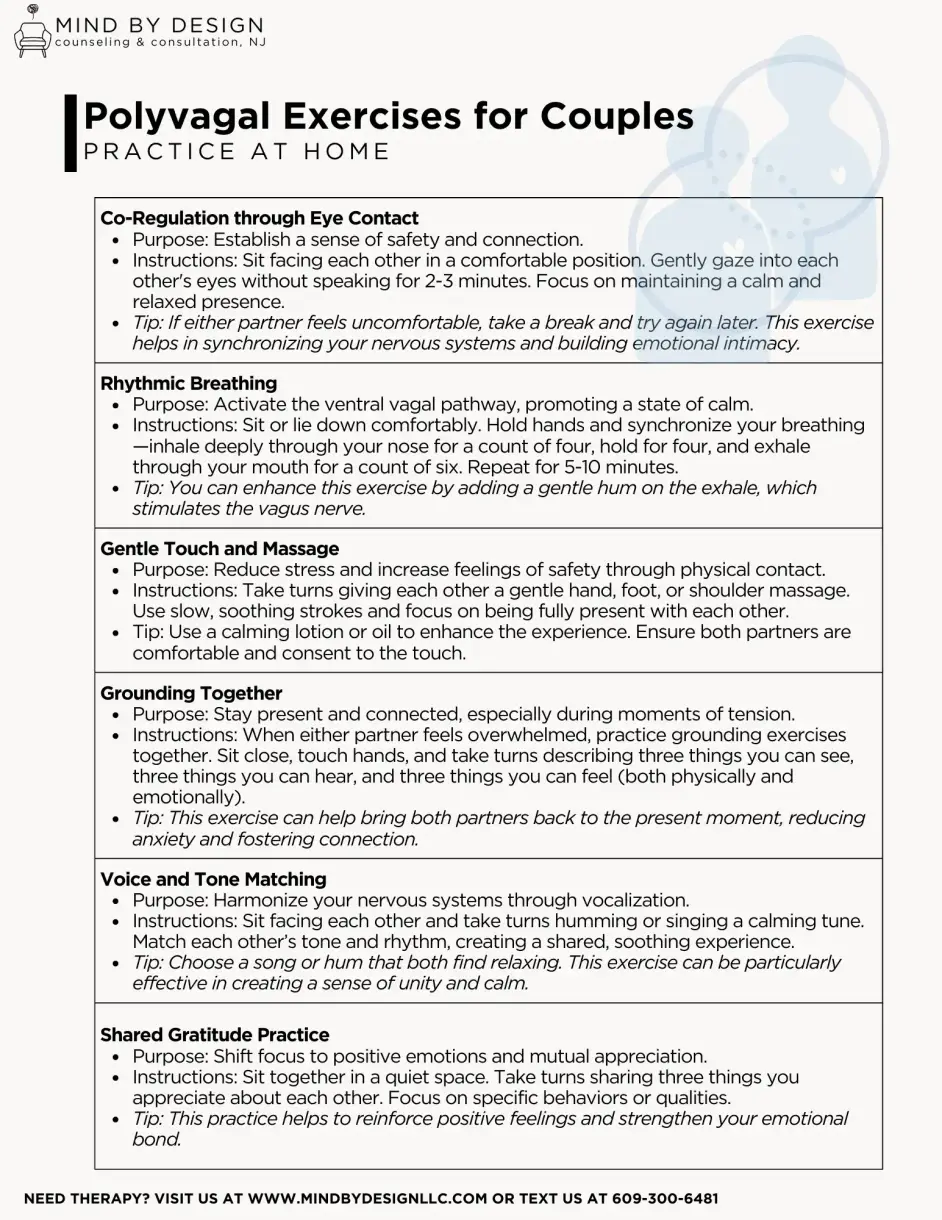Calm Down Anxiety with Our
Top 10 Polyvagal Exercises
Finding the best way to calm down anxiety can be a bit overwhelming with so much information and varying opinions on anxiety management. Of course, everyone responds to anxiety and calming skills differently and the polyvagal exercises are an alternative approach that you may not have tried yet. The polyvagal theory offers insights into how we can calm down anxiety through skills focused on our nervous system. Here’s a step-by-step approach to 10 polyvagal exercises that can help you calm down anxiety.
Polyvagal Theory in a nutshell
This theory, developed by Dr. Stephen Porges, highlights the role of the vagus nerve in regulating our nervous system’s response to stress. By engaging in specific exercises that stimulate the parasympathetic nervous system, we can promote a state of calm and relaxation. Here are 10 evidence-based polyvagal exercises to help you manage anxiety and enhance your well-being.
Try out these skills to calm down anxiety
These exercises, grounded in evidence-based research and the principles of the polyvagal theory, offer a variety of methods to calm the nervous system and improve overall well-being. Practicing these exercises regularly can help in managing stress, reducing anxiety, and enhancing emotional balance.
1. Chanting to Calm Down Anxiety
Chanting is a powerful way to engage the vagus nerve, promoting relaxation and helping to calm down anxiety through the soothing power of vocal vibration.
- Find a quiet, comfortable place to sit.
- Choose a simple, soothing chant, such as “Om” or any other mantra that resonates with you.
- Take a deep breath in, and as you exhale, chant your chosen mantra in a long, drawn-out sound.
- Feel the vibrations in your throat and chest, focusing on the sensation.
- Continue for several minutes, allowing the rhythmic sound and vibration to calm your nervous system.
2. Cold Exposure
A brief cold shower can surprisingly help calm down anxiety by activating the body’s natural stress response in a controlled way.
- Start with a warm shower.
- Gradually decrease the water temperature to cool.
- Aim for 30 seconds to 1 minute of cold exposure.
- Breathe deeply and try to relax into the sensation.
3. Vagus Nerve Stimulation through Breathing
Stimulating the vagus nerve through deep breathing exercises can quickly calm down anxiety, offering a simple yet effective method to regain peace.
- Sit or lie down in a comfortable position.
- Place one hand on your belly.
- Inhale deeply through your nose, feeling your belly rise.
- Exhale slowly through your mouth, feeling your belly fall.
- Repeat for 5-10 minutes.
4. Calm Down Anxiety with Guided Imagery
Visualization techniques can transport you away from anxiety, helping to calm down your mind and body through powerful mental imagery.
- Find a quiet place to sit or lie down.
- Close your eyes and take a few deep breaths.
- Visualize a peaceful scene, like a beach or a forest.
- Focus on the details—sounds, smells, and sensations.
- Stay in this space for several minutes, breathing deeply.
5. Grounding Exercises to Calm Down anxiety
Grounding exercises help reconnect you with the earth, promoting a sense of stability and reducing anxiety by engaging the parasympathetic nervous system.
- Stand barefoot on the ground, whether outside on grass or soil, or indoors on a natural surface.
- Close your eyes and take several deep breaths, focusing on the sensation of the ground beneath your feet.
- Visualize roots growing from the soles of your feet deep into the earth, anchoring you.
- With each exhale, imagine releasing your stress and anxiety into the earth.
- Continue for a few minutes until you feel more centered and calm.
6. Humming or Singing
The act of humming or singing can stimulate the vagus nerve, reducing heart rate and helping to calm down anxiety.
- Choose a comfortable sitting or standing position.
- Pick a simple song or hum a tune.
- Focus on the vibrations in your throat and chest.
- Continue for a few minutes, enjoying the sensation.
7. Progressive Muscle Relaxation (PMR)
PMR is an effective way to release physical tension associated with anxiety, helping you to calm down and relax deeply.
- Start at your feet and work your way up to your face.
- Tense each muscle group for 5 seconds, then relax for 30 seconds.
- Notice the contrast between tension and relaxation.
- Move slowly through each part of your body.
8. Mindful movement to calm down anxiety
Incorporating mindful movement into your daily routine can significantly help calm down anxiety, offering a moment of peace in a busy day.
- Find a quiet, comfortable space.
- Begin with simple poses, focusing on your breath.
- Inhale and exhale slowly and deeply.
- Move with intention, observing how your body feels with each pose.
- Conclude with a few minutes of lying down in a relaxation pose, breathing deeply.
9. Seated Forward Bends Seated Forward Bend
Seated forward bends are excellent for stimulating the vagus nerve and to calm down anxiety. This exercise promotes relaxation by activating the parasympathetic nervous system, reducing heart rate, and encouraging deep breathing.
- Sit on the floor with your legs stretched out in front of you.
- If sitting on the floor is uncomfortable, sit on a firm, cushioned surface to elevate your hips.
- Inhale deeply, lengthening your spine and raising your arms overhead.
- As you exhale, hinge at your hips and gently fold forward over your legs, reaching your hands towards your feet.
- It’s not about how far you go; focus on maintaining a straight back and feeling the stretch along your spine and the back of your legs.
- Allow your head to relax and, if comfortable, close your eyes to enhance the inward focus.
- Hold this position for several deep breaths, focusing on relaxing more deeply into the pose with each exhale.
- To come out of the pose, inhale and gently lift your torso, returning to a seated position with your spine straight.
10. Diaphragmatic Breathing
Diaphragmatic breathing is a cornerstone technique for those looking to calm down anxiety, directly engaging the parasympathetic nervous system to promote relaxation.
- Lie on your back with knees bent, or sit comfortably.
- Place one hand on your chest and the other on your belly.
- Breathe in deeply through your nose, ensuring your belly rises more than your chest.
- Exhale slowly through pursed lips.
Our Areas of Specialty
Learning to Calm Down Anxiety is Within Your Reach.
Incorporating these exercises into your daily routine can significantly reduce anxiety levels. Start with one or two that resonate with you and gradually incorporate more.
Managing anxiety is within your reach. By practicing these polyvagal exercises, you can tap into your body’s natural ability to calm down and find peace. Use this guide as a starting point to explore what works best for you and discover the profound impact these practices can have on your mental health and overall well-being.
FAQ's About Therapy in New Jersey
Where are you located? I need a therapist near me
We are fully online, which means that your therapy sessions will be help via video call on our HIPAA compliant Platform. Anyone in New Jersey can access our therapy services
How do I get started as a new client?
New Clients can reach out to us directly via call, text or email here:
Does my insurance cover my visits?
We provide”Courtesy Billing” for clients who are using the Out-of-network insurance benefits.
Our Insurance Page shares a small blurb about Why We Left Insurance Panels
What are out-of-network benefits?
When using OON benefits, patients typically pay the full cost of the treatment upfront and then file a claim with their insurance company for reimbursement. The amount of reimbursement can vary depending on the plan, but it can sometimes be as high as 90%. Call your insurance to see if you have OON benefits or click here to call us and we can check for you!
Is Online Therapy As Effective As In-Person Therapy?
Online therapy is essentially face-to-face counseling, just conducted remotely. Studies show that teletherapy is as effective as traditional counseling. Professional organizations and state governments recognize its benefits and have set regulations for it. However, like any therapy, its success in achieving your goals isn’t guaranteed. It’s important to discuss with your therapist whether teletherapy is working for you.
How Should I Prepare for My First Session?
Showing up is all that you need to do! But if you really want to get the most out of session, it could help to take some time to think about what you want from therapy. It helps to write down your goals, questions you have or things that you feel are important to share.
Do you offer traditional talk therapy?
of course! though we have some unconventional therapy approaches, we are rooted in evidenced based practices. Talk therapy is a major player in the therapy room! See What we Treat and Integrative Services for more information
Is Virtual Counseling Suitable for Everyone?
Online therapy might not be as effective for individuals with chronic suicidal thoughts, severe trauma, significant mental health history, or those recently in intensive care. Such cases often benefit more from traditional, in-person counseling. We’ll help you decide if our online services are right for you during your intake and evaluation.
Can I Change Therapists If I'm Not Happy?
Yes, you can switch therapists to another provider within the practice, or we can provide you a referral if preferred. We want to ensure that your time and effort are well spent, and that you are getting the relief you need, that’s why we work collaboratively with each other in the practice, as well as outside therapists who we know and trust.
How Do I Know If Therapy Is Helping?
You should feel like you’re making progress. Signs it’s working include:
Feeling comfortable talking to your therapist
Your therapist respects boundaries
You’re moving towards your goals
You feel listened to
You’re doing better in life
Your self-esteem is getting better
What is your cancellation policy?
We ask that clients provide at least 24 hours notice in the event that they need to cancel to avoid the 50% cancellation fee. we understand that life happens and do our best to be flexible & reschedule.
What Geographic Areas Are Served?
Currently, we serve clients in New Jersey and are expanding to other states as telehealth laws evolve. While telehealth offers the convenience of attending sessions from anywhere, state laws require clients to be in-state during their session.
Is Online Therapy Easy to Use for Non-Tech-Savvy People?
Yes, it’s pretty simple to access sessions. You’ll need basic internet skills, such as opening and visiting the patient link sent to you via email. It’s similar to video chatting like Facetime or Zoom. We can also walk you through it on the phone the first time to ensure a strong connection
What Questions Should I Ask My New Therapist?
Feel free to ask anything. Some good questions are:
- How often will we meet?
- What do you specialize in?
- What experience do you have with my issue?
- What outcomes can I expect?
- How will I know I’m progressing?
- How long do you usually work with clients?
- How will we set my treatment goals?
What is the difference between associate therapists & fully licensed therapists?
Our Qualifications:
Our founder, Rebecca Sidoti, is a highly qualified, state-licensed therapist and supervisor with extensive training in anxiety related disorders and innovative treatment such as Ketamine Therapy. Mind by Design Counseling adheres to standards set by the our governing counseling boards.
To see each providers credentials, training and licenses, visit our “Meet the Therapists” Page to learn more.
- LAC/LSW are therapists who may practice clinical work under the supervision of a fully licensed therapist.
- LPC/LCSW are therapists who have completed the necessary clinical hours post-graduation under supervision and can practice clinical work independently.












